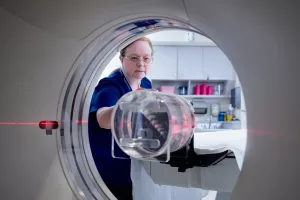Computed tomography (CT) scans are tools that help doctors spot and diagnose conditions like cancers, fractures and lung disease. They create a detailed view of organs and tissues and can even show the dimensions of vessels, lymph nodes and organ systems.
Reducing total radiation by up to 40%
CT scan images look very similar to X-rays, but with much more detail. CT scanners combine a series of X-rays into a detailed image of a specific body part, such as your brain, chest or leg. Our radiologists can view the resulting scans layer by layer or as a single 3D image.
Thanks to the latest low-dose equipment we use in our imaging labs, you can learn so much more about your health with less radiation exposure from CT scans. In fact, our CT scanners use special software to reduce total radiation exposure by up to 40%.

Conditions
Your doctor may order a CT scan if they suspect you're living with one of the following conditions:
Testing
CT scans are versatile tools that provide up-to-date images of your internal health. They can aid your doctor in assessing internal injuries following an accident. Or, your doctor may use a CT scan to pinpoint the location of cancerous or noncancerous tumors.
You can trust that your care plan will be uniquely yours. But first, here are some general guidelines for what to expect during a CT scan.
How to prepare for your exam
We've prepared a few helpful points to prepare you for your exam:
- Please let your radiologist know if you have any allergies (particularly shellfish allergies) or if you are or may be pregnant.
- If your CT scan involves contrast media, avoid eating solid foods for four hours before your appointment. Please arrive 90 minutes early for your appointment to drink the solution.
- If you're having a CT-guided biopsy or drainage, avoid eating or drinking after midnight the night before your exam. You'll also need to arrange for someone to take you home after your appointment.
What to expect during your exam
You'll lie comfortably on your back on an examination table during a CT scan. This table moves through a tube and a large ring called a gantry. The gantry is open at either end, offering people who may be uncomfortable in closed, small spaces more peace of mind.
Your technologist may ask you to hold your breath or refrain from swallowing for several seconds throughout the exam. This helps keep the images in focus.
Although the scan takes only seconds to complete, your technologist may ask you to wait for a few minutes while they check the images.
What to expect after your exam
Following the exam, your radiologist will review your images and send you and your doctor a detailed report of findings and treatment recommendations to you and your doctor.
Treatments
CT scans help doctors get a full picture of a person's health. As important as they are as a diagnostic tool, doctors even turn to CT scans for various treatment procedures in an approach known as interventional radiology. CT-guided procedures, like biopsies, can even serve as a smart alternative to more involved surgeries.
FAQs
Contrast media is a dye that helps doctors examine hard-to-see body parts such as vascular and bowel structures. Contrast media can be taken orally (like a drink) or with an IV (directly into your veins). If your exam requires contrast media, your technologist will review an informational consent form with you before the exam.
When contrast media is given via IV, some patients may experience:
- A cool sensation in their arm
- A warm tingle throughout their body
- Mild nausea
These are all completely normal side effects. You'll be in communication with your technologist throughout your exam, so please let us know if you experience any unusual sensations.

From regular office visits to inpatient stays, find the healthcare you need and deserve close to home.